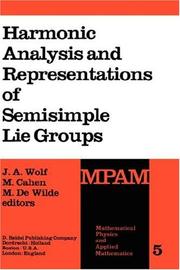| Listing 1 - 8 of 8 |
Sort by
|

ISBN: 9027710422 9400989636 940098961X 9789027710420 Year: 1980 Volume: 5 Publisher: Dordrecht
Abstract | Keywords | Export | Availability | Bookmark
 Loading...
Loading...Choose an application
- Reference Manager
- EndNote
- RefWorks (Direct export to RefWorks)
512 --- Harmonic analysis --- -Representations of groups --- -Semisimple Lie groups --- -Semi-simple Lie groups --- Lie groups --- Group representation (Mathematics) --- Groups, Representation theory of --- Group theory --- Analysis (Mathematics) --- Functions, Potential --- Potential functions --- Banach algebras --- Calculus --- Mathematical analysis --- Mathematics --- Bessel functions --- Fourier series --- Harmonic functions --- Time-series analysis --- Algebra --- Congresses --- Semisimple Lie groups --- Representations of Lie groups --- -Algebra --- 512 Algebra --- -512 Algebra --- Semi-simple Lie groups --- Topological groups. Lie groups --- Harmonic analysis. Fourier analysis --- Analyse harmonique (mathématiques) --- Groupes de Lie semi-simples --- Représentations de groupes --- Representations of groups --- Représentations de groupes. --- Harmonic analysis - Congresses --- Semisimple Lie groups - Congresses --- Representations of Lie groups - Congresses --- Analyse harmonique (mathématiques) --- Représentations de groupes.
Book
ISBN: 3658057092 Year: 2014 Publisher: Wiesbaden : Springer Fachmedien Wiesbaden : Imprint: Springer VS,
Abstract | Keywords | Export | Availability | Bookmark
 Loading...
Loading...Choose an application
- Reference Manager
- EndNote
- RefWorks (Direct export to RefWorks)
Die Gesellschaften Europas reden nicht miteinander – sie reden systematisch aneinander vorbei. Wolf J. Schünemann untersucht mit Hilfe einer vergleichenden Diskursanalyse EU-Vertragsreferenden. In Frankreich und den Niederlanden scheiterte 2005 der europäische Verfassungsvertrag am Votum der Souveräne, und die Iren ließen den Lissabon-Vertrag 2008 in einer ersten Volksabstimmung durchfallen. Die innovative Studie richtet ihren Blick auf die Referendumsdebatten und zerlegt diese nach systematischen Vorgaben in ihre diskursiven Bestandteile (Aussagen, Argumente, Narrative, Deutungsmuster). Die Ergebnisse dienen der Behandlung der zu Beginn formulierten Hypothesen. Ferner skizziert der Autor einen integrationstheoretischen Beitrag sowie Weiterentwicklungsoptionen und Forschungsdesiderate. Der Inhalt Referendumsforschung Wissenssoziologische Diskursanalyse (WDA) Wer spricht? – Analyse der Sprecherpositionen, Was wird (aus-)gesagt? – Analyse der Argumente Die Zielgruppen Dozierende und Studierende der Politikwissenschaft und Soziologie mit Schwerpunkt europäische Integration Interessierte an europäischen Integrationsschritten und europapolitischen Auseinandersetzungen in den Mitgliedstaaten Der Autor Dr. Wolf J. Schünemann studierte Politikwissenschaft, Philosophie sowie Neuere deutsche Literatur und Medien in Kiel und Rennes/Frankreich. Er promovierte an der Universität Koblenz-Landau. Er lehrt und forscht an der Ruprecht-Karls-Universität in Heidelberg.
Sociology. --- Social sciences. --- Knowledge - Discourse. --- Social Sciences, general.
Book
ISBN: 9022008584 Year: 1986 Publisher: Wageningen [Netherlands] : Pudoc,
Abstract | Keywords | Export | Availability | Bookmark
 Loading...
Loading...Choose an application
- Reference Manager
- EndNote
- RefWorks (Direct export to RefWorks)
Agricultural productivity --- Crop yields --- Cropping systems --- Crops and climate --- Crops and soils --- Computer simulation

ISBN: 1280611278 9786610611270 0817644792 0817643915 Year: 2006 Publisher: Boston : Birkhauser,
Abstract | Keywords | Export | Availability | Bookmark
 Loading...
Loading...Choose an application
- Reference Manager
- EndNote
- RefWorks (Direct export to RefWorks)
This monograph, divided into four parts, presents a comprehensive treatment and systematic examination of cycle spaces of flag domains. Assuming only a basic familiarity with the concepts of Lie theory and geometry, this work presents a complete structure theory for these cycle spaces, as well as their applications to harmonic analysis and algebraic geometry. Key features: * Accessible to readers from a wide range of fields, with all the necessary background material provided for the nonspecialist * Many new results presented for the first time * Driven by numerous examples * The exposition is presented from the complex geometric viewpoint, but the methods, applications and much of the motivation also come from real and complex algebraic groups and their representations, as well as other areas of geometry * Comparisons with classical Barlet cycle spaces are given * Good bibliography and index Researchers and graduate students in differential geometry, complex analysis, harmonic analysis, representation theory, transformation groups, algebraic geometry, and areas of global geometric analysis will benefit from this work.
Semisimple Lie groups. --- Flag manifolds. --- Twistor theory. --- Automorphic forms. --- Homogeneous spaces. --- Spaces, Homogeneous --- Lie groups --- Automorphic functions --- Forms (Mathematics) --- Twistors --- Congruences (Geometry) --- Field theory (Physics) --- Space and time --- Flag varieties (Mathematics) --- Manifolds, Flag --- Varieties, Flag (Mathematics) --- Algebraic varieties --- Semi-simple Lie groups --- Global differential geometry. --- Topological Groups. --- Differential equations, partial. --- Global analysis. --- Geometry, algebraic. --- Quantum theory. --- Differential Geometry. --- Topological Groups, Lie Groups. --- Several Complex Variables and Analytic Spaces. --- Global Analysis and Analysis on Manifolds. --- Algebraic Geometry. --- Quantum Physics. --- Global analysis (Mathematics) --- Analysis, Global (Mathematics) --- Differential topology --- Functions of complex variables --- Geometry, Algebraic --- Quantum dynamics --- Quantum mechanics --- Quantum physics --- Physics --- Mechanics --- Thermodynamics --- Algebraic geometry --- Geometry --- Partial differential equations --- Groups, Topological --- Continuous groups --- Geometry, Differential --- Differential geometry. --- Topological groups. --- Lie groups. --- Functions of complex variables. --- Global analysis (Mathematics). --- Manifolds (Mathematics). --- Algebraic geometry. --- Quantum physics. --- Groups, Lie --- Lie algebras --- Symmetric spaces --- Topological groups --- Topology --- Complex variables --- Elliptic functions --- Functions of real variables --- Differential geometry
Book
ISBN: 9781138048720 1138048720 9781315170008 0367490196 1351690604 1351690612 1315170000 Year: 2018 Publisher: London Routledge, Taylor & Francis Group
Abstract | Keywords | Export | Availability | Bookmark
 Loading...
Loading...Choose an application
- Reference Manager
- EndNote
- RefWorks (Direct export to RefWorks)
The Sociology of Knowledge Approach to Discourse (SKAD) hasreoriented research into social forms, structuration and processes of meaning construction and reality formation; doing so by linking social constructivist and pragmatist approaches with post-structuralist thinking in order to study discourses and create epistemological space for analysing processes of world-making in culturally diverse environments.SKAD is anchored in interpretive traditions of inquiry and allows for broadening– and possibly overcoming– of the epistemological biases and restrictions still common in theories and approaches of Western- and Northern-centric social sciences. An innovative volume, thisbook is exactly attentive to these empirically based, globally diverse further developments of approach, with a clear focus on the methodology and its implementation. Thus, The Sociology of Knowledge Approach to Discourse presents itself as a research program and locates the approach within the context of interpretive social sciences, followed byeleven chapters on different cases from around the world that highlight certain theoretical questions and methodological challenges. resenting outstanding applications of the Sociology of Knowledge Approach to Discourse across a wide variety of substantive projects and regional contexts, this text will appeal to postgraduate students and researchers interested in fields such as Discourse Studies, Sociology, Cultural Studies and Qualitative Methodology and Methods.
Knowledge, Sociology of. --- Discourse analysis. --- Knowledge, Sociology of --- Discourse analysis --- #SBIB: --- Discourse grammar --- Text grammar --- Semantics --- Semiotics --- Knowledge, Theory of (Sociology) --- Sociology of knowledge --- Communication --- Knowledge, Theory of --- Public opinion --- Sociology --- Social epistemology --- #SBIB:316.23H1 --- #SBIB:303H12 --- #SBIB:309H511 --- 316.75 --- 316.75 Kennissociologie. Ideologie --- Kennissociologie. Ideologie --- Kennissociologie --- Methoden en technieken: sociale wetenschappen --- Verbale communicatie: algemene pragmatiek, stilistiek en teksttheorie, discoursanalyse --- Methods in social research (general) --- Pragmatics --- Adele E. Clarke;Carolin Küppers;Florian Elliker;Hart Nadav Feuer;Saša Bosanć
Dissertation
Abstract | Keywords | Export | Availability | Bookmark
 Loading...
Loading...Choose an application
- Reference Manager
- EndNote
- RefWorks (Direct export to RefWorks)
Book
ISBN: 3839448646 3837648648 Year: 2019 Publisher: Bielefeld transcript Verlag
Abstract | Keywords | Export | Availability | Bookmark
 Loading...
Loading...Choose an application
- Reference Manager
- EndNote
- RefWorks (Direct export to RefWorks)
Die Bedeutung der Digitalisierung für Politik und Gesellschaft ist ein hoch aktuelles Themenfeld, das immer stärker auch politikwissenschaftlich beforscht und gelehrt wird. Die Beiträge des Bandes versammeln dazu programmatische Positionen, welche zentrale Aspekte und Perspektiven der sozialwissenschaftlichen Digitalisierungsforschung darstellen und diskutieren. Hierzu zählen u.a. Forschungsfelder aus den Bereichen Partizipations- und Parteienforschung, Governance der Digitalisierung, methodische Reflexionen über Computational Social Science und die Analyse von Demokratie und Öffentlichkeit unter den Bedingungen der Digitalisierung. » Mit dem Sammelband [...] wird ein disziplinärer und interdisziplinärer Überblick über die neuere Forschung zum Thema Politik und Digitalisierung vorgelegt.« Jos Schnurer, www.socialnet.de, 24.01.2020 Besprochen in: Der Tagesspiegel, 27.02.2020, Christoph David Piorkowski
Political science & theory --- Civil Society. --- Digital Media. --- Internet. --- Political Science. --- Political Sociology. --- Political Theory. --- Digitalisierung; Politik; Internet; Gesellschaft; Politische Kommunikation; Partizipationsforschung; Parteienforschung; Governance; Computational Social Science; Öffentlichkeit; Zivilgesellschaft; Politische Theorie; Digitale Medien; Politische Soziologie; Politikwissenschaft; Big Data; Digitalization; Politics; Society; Political Communication; Participation Research; Party Research; Public Sphere; Civil Society; Political Theory; Digital Media; Political Sociology; Political Science --- Political science --- Information society. --- Technological innovations.
Book

ISBN: 3847417207 384742520X Year: 2022 Publisher: Leverkusen-Opladen : Verlag Barbara Budrich,
Abstract | Keywords | Export | Availability | Bookmark
 Loading...
Loading...Choose an application
- Reference Manager
- EndNote
- RefWorks (Direct export to RefWorks)
We live in a world of algorithmic sorting and decision-making. Mathematical models curate our social relationships, influence our elections and even decide whether we should go to prison or not. But how much do we really know about code, algorithmic structures and how they work? This book turns to questions of autonomy in the digital age from an interdisciplinary perspective, combining contributions from philosophy, education and cultural studies with computer science. Wir leben in einer Welt der algorithmischen Sortierung und Entscheidungsfindung. Mathematische Modelle kuratieren unsere sozialen Beziehungen, beeinflussen unsere Wahlen und entscheiden sogar darüber, ob wir ins Gefängnis gehen sollten oder nicht. Aber wie viel wissen wir wirklich über Code, algorithmische Strukturen und deren Wirkweisen? Der Band wendet sich den Fragen der Autonomie im digitalen Zeitalter aus einer interdisziplinären Perspektive zu, indem er Beiträge aus Philosophie, Erziehungs- und Kulturwissenschaft mit der Informatik verbindet.
| Listing 1 - 8 of 8 |
Sort by
|

 Search
Search Feedback
Feedback About UniCat
About UniCat  Help
Help News
News